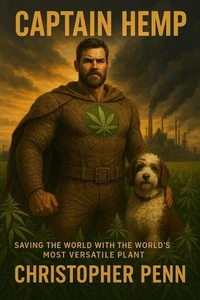Hemp Rising is a meticulously researched and passionately written call to restart industrial hemp as a cornerstone of a regenerative future. Christopher Penn, founder of Mr. Hemp HouseT, weaves together history, science, policy, and practical applications to demonstrate how one plant can revolutionize multiple industries and restart a hemp economy on a national scale. This economic resurgence will create new jobs, reduce our reliance on environmentally harmful industries, restart US manufacturing, and pave the way for a more sustainable future.
The book begins with a captivating historical account tracing hemp's use across 10, 000 years of civilization, from ancient Chinese papermaking to its foundational role in naval empires and colonial economies. Hemp was essential to war, exploration, medicine, and domestic life. In the 20th century, industrial lobbyists, media propaganda, and political maneuvering nearly erased this plant from public memory.
Penn powerfully details its prohibition, highlighting figures like William Randolph Hearst and Harry Anslinger and their role in conflating hemp with marijuana. The resulting publicity criminalized a harmless and beneficial crop to protect the interests of the timber, petroleum, and plastics industries. The second section explores hemp's modern comeback. The book highlights hemp as a hero of regenerative architecture, from the Gaia line of products of Mr Hemp HouseT to hempcrete, and other green construction, carbon-negative insulation, and mold-resistant wall installations.
Its use in textiles, plastics, batteries, fuel, and even aerospace composites showcases its versatility and inspires a new wave of innovation. The nutritional section delves into hemp's value as a complete protein and superfood, spotlighting hemp-derived cannabinoids like CBD and CBG for wellness. This information will leave the readers feeling more knowledgeable about the health benefits of hemp.
In the later chapters, Penn focuses on reform. He explores the legal timeline of hemp. Starting with its prohibition in 1937, the 2018 Farm Bill outlines the cultural changes driven by activists, scientists, and entrepreneurs. He casts a compelling vision of a 'circular economy' where hemp is cultivated not for short-term profit, but for long-term global healing. In this model, hemp is grown, processed, and used in a way that minimizes waste and maximizes the value of the plant, creating a sustainable and regenerative system.
More than just a reference, Hemp Rising is a manifesto. A statement. It's written for visionaries, farmers, builders, designers, policy makers, and citizens who see hemp not as a buzzword, but as a mandate. Backed by historical scope and scientific facts, the book argues that hemp is not an alternative but the original. And in reclaiming it, we reclaim a future worth building.
Hemp Rising is a meticulously researched and passionately written call to restart industrial hemp as a cornerstone of a regenerative future. Christopher Penn, founder of Mr. Hemp HouseT, weaves together history, science, policy, and practical applications to demonstrate how one plant can revolutionize multiple industries and restart a hemp economy on a national scale. This economic resurgence will create new jobs, reduce our reliance on environmentally harmful industries, restart US manufacturing, and pave the way for a more sustainable future.
The book begins with a captivating historical account tracing hemp's use across 10, 000 years of civilization, from ancient Chinese papermaking to its foundational role in naval empires and colonial economies. Hemp was essential to war, exploration, medicine, and domestic life. In the 20th century, industrial lobbyists, media propaganda, and political maneuvering nearly erased this plant from public memory.
Penn powerfully details its prohibition, highlighting figures like William Randolph Hearst and Harry Anslinger and their role in conflating hemp with marijuana. The resulting publicity criminalized a harmless and beneficial crop to protect the interests of the timber, petroleum, and plastics industries. The second section explores hemp's modern comeback. The book highlights hemp as a hero of regenerative architecture, from the Gaia line of products of Mr Hemp HouseT to hempcrete, and other green construction, carbon-negative insulation, and mold-resistant wall installations.
Its use in textiles, plastics, batteries, fuel, and even aerospace composites showcases its versatility and inspires a new wave of innovation. The nutritional section delves into hemp's value as a complete protein and superfood, spotlighting hemp-derived cannabinoids like CBD and CBG for wellness. This information will leave the readers feeling more knowledgeable about the health benefits of hemp.
In the later chapters, Penn focuses on reform. He explores the legal timeline of hemp. Starting with its prohibition in 1937, the 2018 Farm Bill outlines the cultural changes driven by activists, scientists, and entrepreneurs. He casts a compelling vision of a 'circular economy' where hemp is cultivated not for short-term profit, but for long-term global healing. In this model, hemp is grown, processed, and used in a way that minimizes waste and maximizes the value of the plant, creating a sustainable and regenerative system.
More than just a reference, Hemp Rising is a manifesto. A statement. It's written for visionaries, farmers, builders, designers, policy makers, and citizens who see hemp not as a buzzword, but as a mandate. Backed by historical scope and scientific facts, the book argues that hemp is not an alternative but the original. And in reclaiming it, we reclaim a future worth building.

 , qui est-ce ?
, qui est-ce ?